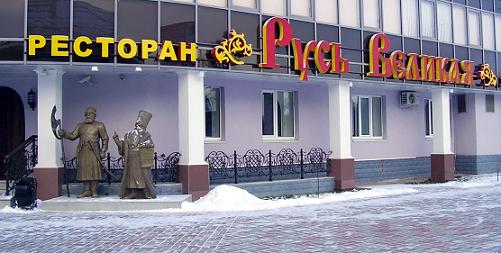Russian Cases: «Именительный падеж» [Nominative] Posted by josefina on Apr 6, 2009 in language
«Именительный падеж» [nominative case] is a good case to use in the names of shops, cafes, movie theaters and restaurants, like this one on the picture above: «РесторанРусьВеликая» [Restaurant The Great Rus’].
Even though it is obvious to anyone who reads this blog once in a while that there cannot be a single post about Russian language without a little something about the six cases, I’ve come to the conclusion that it is not enough. I want more – and I think we all need more. «Большеопадежах!» [More about cases!] We must dedicate ourselves to deeper study of the cases, we must go further than we have ever gone before in order to fully understand them, and finally learn how to use them correctly. But let’s not go all ‘case-crazy’ and throw ourselves straight away into difficult verbs like «пренебрегать» [to scorn; disdain; look down on; to disregard; ignore (rules, advice, etc); to neglect (one’s duties, health, etc)] that can only be followed by a word answering the question «чем? кем?» [‘with what’? ‘with whom?’], thus by a noun of the «творительныйпадеж» [instrumental case]. Let’s start out easy – by finding out where «падеж», the Russian word for ‘case’, comes from. Let’s have a look in the darling «ЭтимологическийсловарьрусскогоязыкаМ. Фасмера», now shall we not?
«Падеж – ввиду -е- (вместо ё) заимствованное из церковнославянского и древнерусского языков. В грамматическом значении, как и латинское слово casus, калька с греческого слова, что обозначает «падаю», и происходит из терминологии игры в кости.» [Case – since there’s a ‘ye’ (instead of a ‘yo’) it is borrowed from Old Church Slavonic and Old Russian languages. In the grammatical sense, just like the Latin word casus it is a loan translation (calque) from the Greek word that means ‘I am falling’, and comes from a term used when playing dice.]
Now since that’s been settled, let’s start our journey through the six cases of Russian language with the first – and most simple – of them: «именительныйпадеж» [nominative cases]. So what does our dear Фасмер have to say about this word?
«Именительный падеж – калька с латинского слова nominativus, о падеже, который употреблялся, если требовалось просто назвать имя кого-либо.» [Nominative case – a loan translation from the Latin word nominativus, about the case which was used when it was only necessary to call somebody’s name.]
Often you see «именительныйпадеж» in the names of movies, theater shows, operas, books or at museum exhibitions. Like this one called «ГУЛАГ. История, трудибыт.» [GULAG. History, work and life.].
Now that we’ve cleared up the fact that the nominative case in Russian language is used when you’re just stating what someone or something is called (or their names), it should be added that this case answers the questions «Что?» [what?] and «Кто?» [who?]. Let’s take a look at some sentences:
«Онабалерина» [She’s a ballerina].
«Он инженер» [He’s an engineer].
«Этомойбрат» [This is my brother].
«Это мой самый лучший друг/самая лучшая подруга» [This is my best friend].
«Тамстоиттеатр» [Over there is a theater].
«Вотмоякомната!» [This is my room!]
«Вотлежитноваякнига» [There lays a/the new book].
«Первыенеделиянварябылиоченьсуровы» [The first weeks of January were very cold].
«Какойпутьсамыйкороткий?» [Which way is the shortest?]
I hope this was «полезно» for you all, and if you have any other sentences with words in the nominative case that you’d like to add to the collection, be sure to leave a comment with them! And I advice you to gather courage and conviction because next time it’ll be tougher – for all of us – with «родительныйпадеж» [genitive case]…

Build vocabulary, practice pronunciation, and more with Transparent Language Online. Available anytime, anywhere, on any device.





Comments:
Катя:
Why can’t I get your photos any more? -Катя
Leona Semizian:
I have not received any photos from your blogs for the past several e-mails.
john jaklich:
Dear Josefina
I have a rather long request of you and wondered if I could email you without posting it on the net? Addresses and such…john
Josefina:
John Jaklich – you are welcome to write your request to me in an e-mail to the following address: josefinalundblad@gmail.com.
I can only hope that I will able to help you!